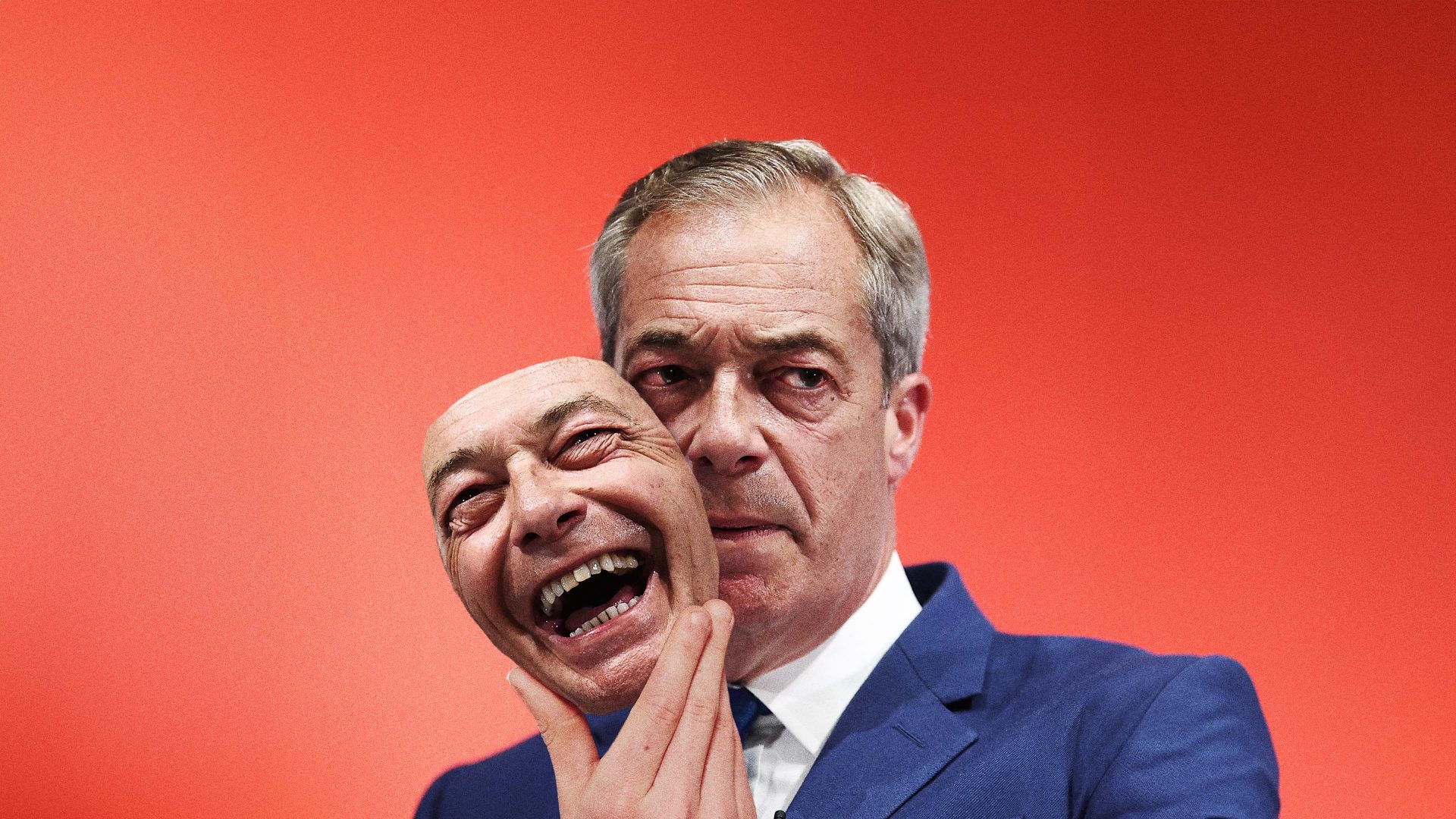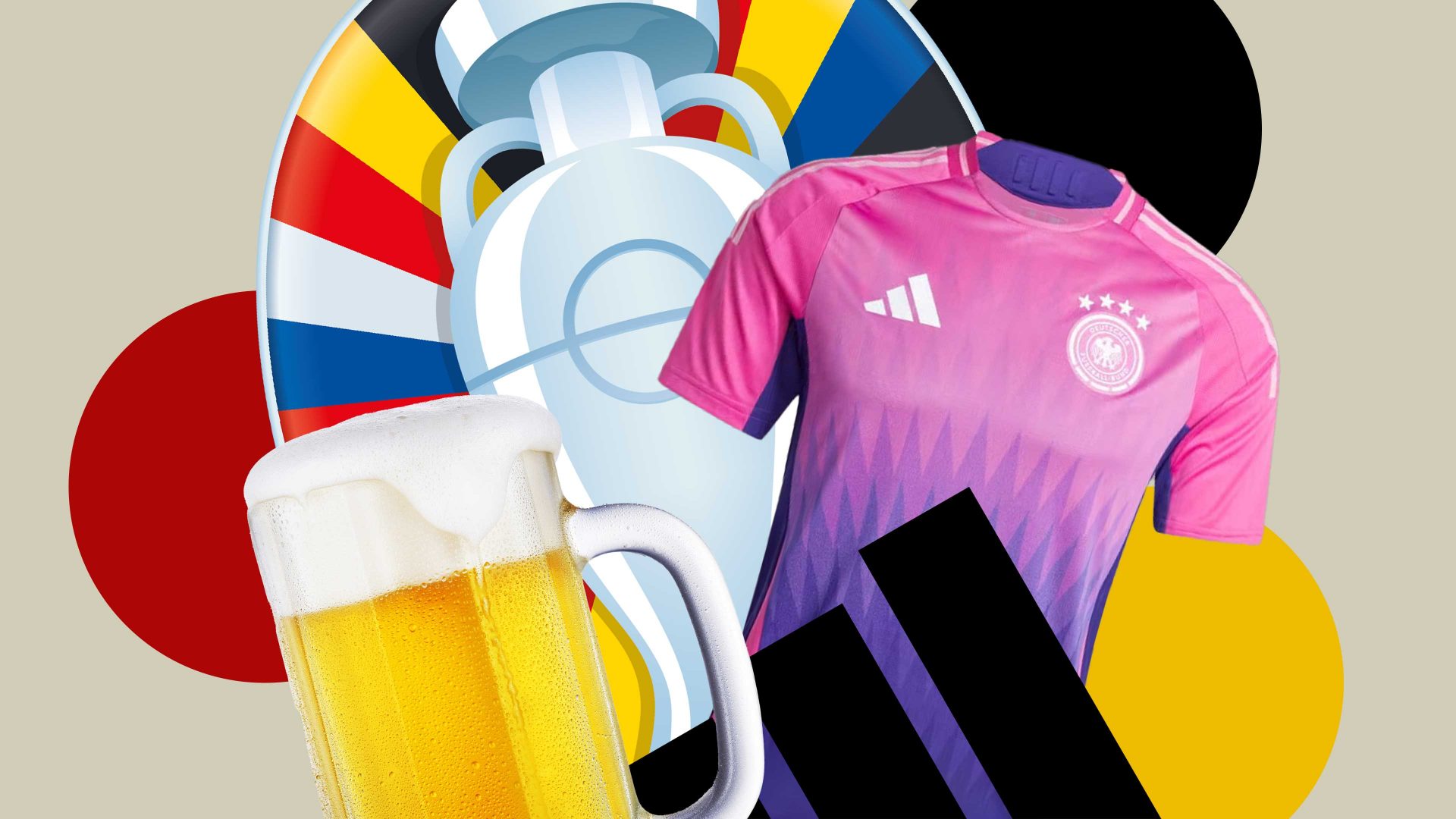One may smile, and smile, and be a villain: the line might have been written to capture the devious nature of Nigel Farage. Affable, gregarious, pub-ready, unfazed by opposition, he communicates a sunny optimism while delivering a poisonous message. It is a toxic talent, and one that should never be underestimated.
In last Friday’s seven-way BBC debate – appearing as Reform UK’s newly self-installed leader and candidate for Clacton – he gave an unscrupulous masterclass in the art of the dog-whistle.
Of Rishi Sunak’s disastrous early exit from the D-day commemorations in Normandy, Farage declared that “if his instinct was the same as the British people[’s] he would never have contemplated for a moment not being there for the big international ceremony, and it shows how disconnected he is with the people of this country.”
In Saturday’s Times, he said much the same to Andrew Billen, claiming that the prime minister “has no sense of our history, or feeling genuinely for the culture that is out there among ordinary people. He’s utterly disconnected in every way”.
Billen, correctly, challenged him on the racist overtones of this verdict. Why, exactly, was Sunak “disconnected”? “Class. His job… When’s the last time Sunak went out and had a drink with a working-class person?”
This is a classic Trumpesque ploy, a means of making voters feel more comfortable about their prejudice. In the US: you don’t dislike Black people, you’re just worried about critical race theory in schools. You’re not hostile to Latinos, you just fret about chaos at the border.
In this country: you don’t distrust Sunak because he is a Hindu of Indian heritage, but because he is a super-wealthy investor. Call it “hate-washing”.
Back to Friday’s debate: Farage proposed that this should be “the immigration election” but insisted that his concerns were driven by the capacity of our public services rather than race.
“Whether we talk about housing,” he said, “whether we talk about the fact that rents are up between 20 and 30% in most of the country in the last four years, whether we talk about the roads, whether we talk about infrastructure, we are living through a population crisis, an increase of 10 million people since Mr Blair came to power, and frankly it’s making us poorer, it is diminishing our quality of life – and it’s nothing to do, nothing to do with race or any of those issues, it’s to do with actually putting the interests of our communities first”.
When Rhun ap Iorwerth, the leader of Plaid Cymru, took issue with the thinly concealed bigotry of Farage’s assertions, he let rip like a sarcastic child: “Open doors, everyone come, everyone come, benefits for everybody, lovely!”
As the debate turned to knife crime, he was at it again. “We know the areas in which knives are most prevalent. Stop and search! And, of course, we don’t do it – oh gosh, if this area has got a high proportion of people from the black or ethnic minority communities, they might call us racist! We’ve got to stop doing this. We’ve got to completely forget the colour of people’s skin, treat everybody equally”.
His opponents, he said, were “too scared to do what needs to be done”.
This is vintage Farage: the claim that he is simply confronting woke cowardice rather than striking sparks against the tinder of racial division. He is – he would argue – speaking up for common sense in the face of ideologues, rather than stoking nativist resentment and social division.
Though he plays these word games, it is noticeable that his position on Islam in particular is hardening explicitly. On May 26, he told Trevor Phillips on Sky News that “[we] have a growing number of young people in this country who do not subscribe to British values, [who] in fact loathe much of what we stand for”.
Asked if “we are talking about Muslims here”, he replied: “We are. And I’m afraid I found some of the recent surveys saying that 46% of British Muslims support Hamas – support a terrorist organisation that is proscribed in this country. What is interesting is that this prime minister is building up far more of that population than anybody before in history”.
The latter assertion was an indirect reference to the “Great Replacement” theory: the poisonous claim that white people are being systematically displaced by other races, and especially those of Islamic heritage.
Farage’s devotion to Brexit, of course, always had more to do with identity, race and culture than the abstractions of sovereignty. That much was clear from the vile “Breaking Point” poster that his Leave.EU campaign released on June 16, 2016, depicting a long line of Syrian refugees.
But, since the pandemic, he has diversified his areas of interest, capitalising on the cluster of conspiracy theories that were nurtured during the intense months of lockdown. He has deepened his commitment to culture wars (while claiming to disavow them), his opposition to “globalism” and his opportunistic attacks on “wokery”.
Most strikingly, he has led the retreat from net zero pledges, establishing the “Britain Means Business” campaign in March 2022, and demanding a referendum on the emissions target. If Reform UK has a presence in the House of Commons after the election, this will be one of its fixations.
In last weekend’s Sunday Telegraph, Farage wrote that “this is the moment for… my party, to replace the Tories for good”. Bold words. But it is important to unpack precisely what he means by this.
Without question, he is now pursuing a parliamentary realignment that will put him at the head of a Reform-Conservative alliance, and in a position to challenge Keir Starmer for the top job in 2029.
He has allies within the Tory fold, such as Suella Braverman, the former home secretary, who said in a Times interview on Monday that it was time to “unite the right”. Abroad, he is well-connected among the hard right parties that prospered in the European elections and with key figures in the MAGA movement.
Last week, the US conservative journal, the National Review, excitedly compared Farage’s theatrical return to Donald Trump’s descent on the golden escalator in Trump Tower in 2015 to announce his presidential candidacy.
But he has also studied the precedent of the Social Democratic Party, its foundation in 1981 and its failure to displace Labour. He grasps the fiendish difficulties and risks of political mergers and takeovers.
At the same time, more than any other party leader, he understands where power lies in contemporary politics; in networks as much as in institutions.
“Conventionally, we think you have to be in the House of Commons to change public opinion in Britain,” he said on Nick Robinson’s podcast in February. “That just is no longer the case. You know, through social media; through many other things, there are ways that people can – people of influence – can change the thinking of a country.
“I’m not using TikTok to comment. I’m using TikTok to reach young people and say: have you thought of it like this? Have you ever considered that maybe the approach you’re being taught at school isn’t right, there’s a different point of view?”
Farage already has 632,500 followers on that platform. The @uklabour account, for comparison, only has 184,800, while @ukconservatives has 56,900. (Trump, who only joined TikTok this month, already has 5.9 million followers.)
Why mention these statistics at all? Because what Farage intuits more than any other UK party leader is that, in 21st-century politics, parliamentary representation is only one form of power, and parties are increasingly mutable delivery systems for particular campaigns, issues, or personalities. Reform UK itself is no more than a limited company whose controlling majority shareholder is its new leader.
He is using social media with a view to building up a much larger – and younger – network of support than old-fashioned campaigns can supply. Until he was compelled by last week’s announcement to quit the role, much of his power derived from his prominence as a GB News host and his readiness to take risks like competing in last year’s I’m a Celebrity… Get Me Out of Here! (he finished third).
He also understands the nature of modern political narrative: the plot twists, the setbacks, the pacing, the reveals. It is striking that he begins almost every interview or debate with the assumption that Labour has already won the election and that the real race is to decide who will challenge Starmer five years hence. His horizons are definitely not confined to polling day on July 4 (fun fact: the Labour leader is almost a year and a half older than Farage).
Like all populist nationalists, he assumes that a “globalist” technocrat like Starmer is no less doomed to fail than was Sunak. He plans on the basis that the cohort of the disenfranchised and the despairing will grow accordingly, and that they will look for a tribune.
This is not the 1930s. Still, there is a whiff of Weimar in the air. And when I hear Farage and his fervour, I am haunted by the words of Fritz Stern in his classic 1961 study of the road to tyranny, The Politics of Cultural Despair: “They hated liberalism, blamed it for making outcasts of them, for uprooting them from their imaginary past”.
This is the paradox of the Reform leader. He grins, quips and chuckles; but what underpins his politics is venom, resentment and antagonism. The trademark smile is really a rictus of mean-spirited determination. The more the Tories flail, the more persuaded this dangerous man becomes that his hour, at last, is at hand.




